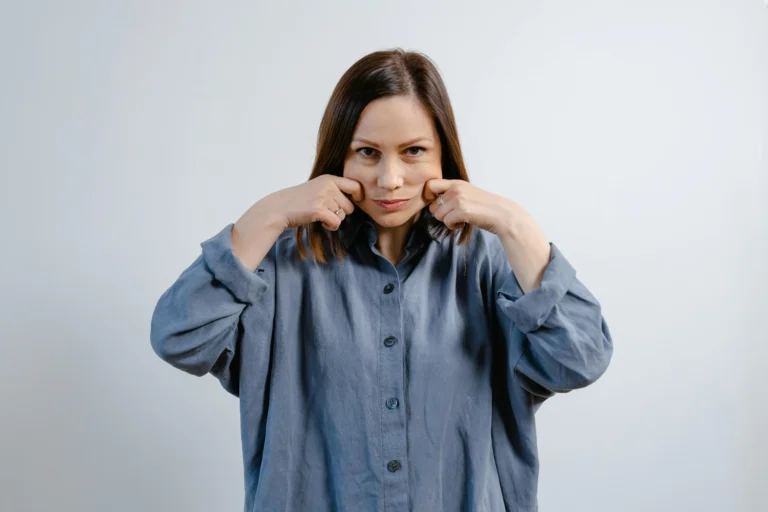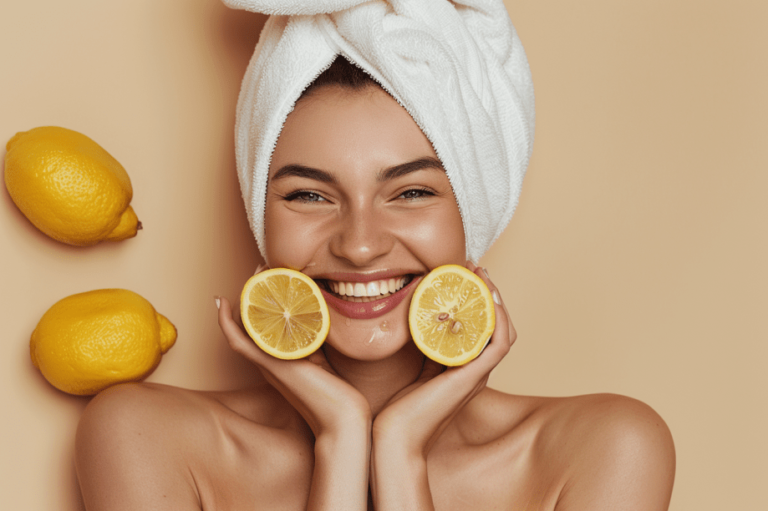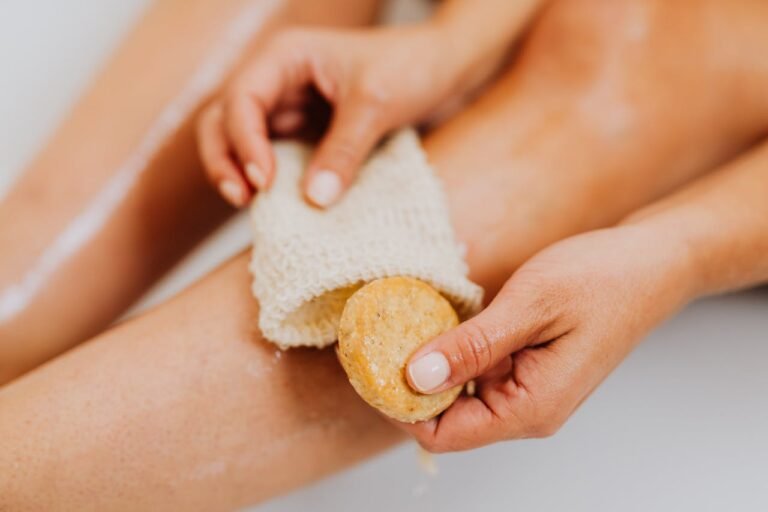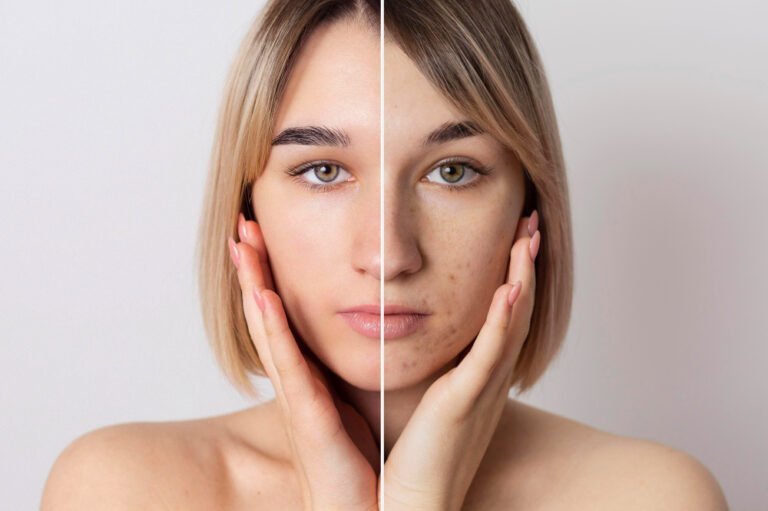The Complete Guide To Treating Acne-Prone Skin That Works
Use gentle cleansers and oil-free moisturizers to treat acne-prone skin. Avoid harsh scrubs and heavy makeup.
Acne-prone skin requires careful and consistent care. Choose products labeled non-comedogenic to prevent clogged pores.
Regularly washing your face with a mild cleanser helps remove excess oil and dirt. Avoid picking or squeezing pimples to reduce the risk of scarring.
Incorporate a light, oil-free moisturizer to keep your skin hydrated without adding extra oil. Look for treatments with salicylic acid or benzoyl peroxide to target acne effectively.

Protect your skin from the sun by using a broad-spectrum sunscreen. Consulting a dermatologist can provide personalized advice and treatments tailored to your specific skin needs.
Consistency and patience are key to achieving clearer skin.
Understanding Acne-prone Skin
Understanding Acne-Prone Skin is the first step in effectively treating and managing acne. Acne is a common skin condition that affects millions of people worldwide.
It is characterized by the presence of pimples, blackheads, and whiteheads. Knowing the root causes and types of acne can help you select the right treatment and skincare routine.
Causes Of Acne
Acne can be triggered by multiple factors. Here are some common causes:
| Cause | Description |
|---|---|
| Hormonal Changes | Fluctuations in hormones increase oil production. |
| Excess Oil Production | Sebaceous glands produce too much sebum. |
| Dead Skin Cells | Dead skin cells block hair follicles. |
| Bacteria | Propionibacterium acnes causes inflammation. |
| Diet | High-glycemic foods and dairy worsen acne. |
| Stress | Stress increases hormone production. |
| Medications | Corticosteroids and lithium trigger breakouts. |

Types Of Acne
Acne comes in various forms. Understanding the types can help tailor your treatment.
| Type | Description |
|---|---|
| Whiteheads | Closed comedones, small white bumps. |
| Blackheads | Open comedones, black due to oxidation. |
| Papules | Small, red/pink tender bumps. |
| Pustules | Red pimples with white/yellow pus center. |
| Nodules | Large, painful lumps under the skin. |
| Cysts | Deep, painful, pus-filled lesions. |
Identifying your acne type is crucial. Each type requires a different treatment approach; knowing your acne type helps you choose the right products and treatments.
Effective Skincare Regimen
Struggling with acne-prone skin can be frustrating, but an effective skincare regimen can make a world of difference. Following a structured routine can help reduce breakouts and keep your skin healthy.

This guide will walk you through the steps of cleansing, toning, and moisturizing to achieve clearer skin.
Cleansing
Cleansing is the foundation of any skincare regimen, especially for acne-prone skin. Proper cleansing removes dirt, excess oil, and impurities that clog pores.
Here are some tips for effective cleansing:
- Use a gentle cleanser: Opt for a cleaner free from harsh chemicals and fragrances.
- Wash twice daily: Cleanse your face in the morning and before bed.
- Avoid scrubbing: Use your fingertips to massage the cleanser into your skin gently.
Choose a cleanser with ingredients like:
| Ingredient | Benefit |
|---|---|
| Salicylic Acid | Helps unclog pores |
| Benzoyl Peroxide | Reduces bacteria |
| Tea Tree Oil | Natural antibacterial properties |
Toning
Toning helps to balance the skin’s pH and remove any leftover impurities after cleansing.
Key benefits of using a toner include:
- Minimizing pores: Helps to tighten and refine the appearance of pores.
- Controlling oil: Can reduce excess oil production.
- Refreshing the skin: Provides a soothing effect.
Look for toners with these ingredients:
| Ingredient | Benefit |
|---|---|
| Witch Hazel | Anti-inflammatory properties |
| Niacinamide | Reduces redness and inflammation |
| Aloe Vera | Soothes the skin |
Moisturizing
Moisturizing is crucial, even for acne-prone skin. It helps maintain the skin’s barrier and prevents dryness.
Essential tips for moisturizing:
- Choose non-comedogenic products: These won’t clog your pores.
- Look for lightweight formulas: Gel-based moisturizers work well.
- Hydrate without overloading: Use a small amount to avoid greasiness.
Beneficial ingredients for moisturizers:
| Ingredient | Benefit |
|---|---|
| Hyaluronic Acid | Provides deep hydration |
| Ceramides | Strengthens the skin barrier |
| Glycerin | Locks in moisture |
Topical Treatments
Acne-prone skin can be challenging to manage, but the right topical treatments can make a significant difference. These treatments target the root causes of acne, such as excess oil production, clogged pores, and bacteria. This section will explore the most effective topical treatments for acne-prone skin.

Benzoyl Peroxide
Benzoyl Peroxide is a powerful ingredient known for killing acne-causing bacteria. It also helps to unclog pores and reduce inflammation. Here are some key points about Benzoyl Peroxide:
- Antibacterial Properties: Kills bacteria that cause acne.
- Exfoliating: Helps to remove dead skin cells that can clog pores.
- Anti-Inflammatory: Reduces redness and swelling.
When using Benzoyl Peroxide, start with a lower concentration to avoid skin irritation. Gradually increase the strength as your skin adjusts. Here’s a simple usage guide:
| Concentration | Usage |
|---|---|
| 2.5% | For sensitive skin, use once daily. |
| 5% | For moderate acne, use twice daily. |
| 10% | For severe acne, follow a dermatologist’s advice. |
Salicylic Acid
Salicylic Acid is another effective treatment for acne-prone skin. It works by exfoliating the skin and keeping pores clear. Here are the benefits of Salicylic Acid:
- Exfoliates: Removes dead skin cells, preventing clogged pores.
- Anti-Inflammatory: Reduces swelling and redness.
- Comedolytic: Helps to dissolve blackheads and whiteheads.
Salicylic Acid is available in various forms, such as cleansers, toners, and spot treatments. Here’s how to incorporate it into your routine:
- Cleanser: Use a Salicylic Acid cleanser once or twice daily.
- Toner: Apply a Salicylic Acid toner after cleansing.
- Spot Treatment: Use a concentrated Salicylic Acid gel on active pimples.
Start with a lower concentration, especially if you have sensitive skin. Gradually increase the concentration as your skin builds tolerance.
Retinoids
Retinoids are derivatives of Vitamin A and are highly effective for treating acne. They work by increasing cell turnover and preventing clogged pores. Here are the main benefits of Retinoids:
- Cell Turnover: Promotes faster skin cell renewal.
- Prevents Clogged Pores: Keeps pores clear by preventing dead skin buildup.
- Anti-aging: Reduces fine lines and wrinkles.
Retinoids come in various forms, including creams, gels, and serums. Here’s how to use them:
- Start Slow: Use a pea-sized amount every other night.
- Build Tolerance: Gradually increase to nightly use.
- Moisturize: Follow up with a good moisturizer to prevent dryness.
Retinoids can initially cause dryness and irritation, so using them correctly is crucial. Always apply sunscreen during the day, as Retinoids can make your skin more sensitive to the sun.
Oral Medications
Oral medications can offer effective solutions for acne-prone skin. These medications work from within to target the root causes of acne.
Oral treatments are often prescribed for moderate to severe acne, especially when topical treatments have failed. Two common types of oral medications are antibiotics and isotretinoin.
Antibiotics
Oral antibiotics are a popular choice for treating acne. They help reduce inflammation and kill the bacteria that cause acne. Some commonly prescribed antibiotics for acne include:
- Tetracycline
- Doxycycline
- Minocycline
These antibiotics are usually prescribed for a short period, often three to six months. It’s important to follow the doctor’s instructions to avoid antibiotic resistance.
Besides reducing bacteria, antibiotics also lower inflammation, making them a dual-purpose treatment.
Here is a quick overview of how these antibiotics work:
| Antibiotic | Function |
|---|---|
| Tetracycline | Kills bacteria and reduces inflammation |
| Doxycycline | More effective in killing bacteria |
| Minocycline | Penetrates deeper into skin tissues |
While effective, antibiotics can have side effects, such as stomach upset or sun sensitivity. Always consult with a healthcare provider to determine the best treatment plan for your skin type.
Isotretinoin
Isotretinoin is another powerful oral medication for severe acne. Known by its brand name Accutane, isotretinoin targets all major causes of acne:
- Reduces oil production
- Decreases inflammation
- Fights bacteria
- Prevents clogged pores
Isotretinoin is usually taken for four to six months. This medication can lead to significant improvement and sometimes even permanent acne clearance. Due to its potency, isotretinoin is often reserved for severe cases.
Here are some key points about isotretinoin:
- Highly Effective: Often clears acne completely.
- Side Effects: This can cause dry skin, lips, and eyes.
- Monitoring: Requires regular blood tests to check liver function.
Due to its potential side effects, a dermatologist must prescribe isotretinoin. Patients taking isotretinoin must also follow strict guidelines to avoid pregnancy due to the risk of severe birth defects.
Consulting with a healthcare professional ensures that isotretinoin is used safely and effectively, providing lasting relief from severe acne.
Natural Remedies
Dealing with acne-prone skin can be frustrating. Many people use harsh chemicals, but natural remedies offer gentle and effective solutions. These natural options can reduce acne, soothe irritation, and improve skin health without side effects.

Let’s explore some powerful natural remedies for acne-prone skin.
Tea Tree Oil
Tea tree oil is a popular natural remedy for acne. Its anti-inflammatory and antimicrobial properties make it effective in treating pimples. This essential oil reduces redness and swelling, promoting clear skin.
To use tea tree oil, follow these steps:
- Mix a few drops of tea tree oil with a carrier oil like coconut or jojoba oil.
- Apply the mixture to the affected areas using a cotton swab.
- Leave it on for 15-20 minutes, then rinse with warm water.
- Repeat this process twice daily for best results.
- Always perform a patch test to ensure no allergic reaction.
- Do not apply undiluted tea tree oil directly to the skin.
| Benefit | Description |
|---|---|
| Anti-inflammatory | Reduces redness and swelling. |
| Antimicrobial | Kills acne-causing bacteria. |
| Natural | Gentle on the skin without harsh chemicals. |
Aloe Vera
Aloe vera is another excellent natural remedy for acne-prone skin. Its soothing properties help reduce inflammation and redness, promote healing, and prevent scarring.

To use aloe vera, follow these steps:
- Extract fresh aloe vera gel from an aloe leaf.
- Apply the gel directly to the acne-affected areas.
- Leave it on for 20-30 minutes, then rinse with cool water.
- Use this treatment twice daily for optimal results.
- Moisturizes the skin without making it greasy.
- Contains antioxidants that promote overall skin health.
- Helps in fading acne scars over time.
| Nutrient | Benefit |
|---|---|
| Vitamins A, C, and E | Antioxidant properties that protect and repair the skin. |
| Polysaccharides | Help in skin repair and regeneration. |
| Minerals like zinc | Reduce inflammation and promote healing. |
Lifestyle Changes
Struggling with acne can be frustrating. While many turn to products and treatments, lifestyle changes can make a huge difference.
Adjusting your habits can help your skin heal and prevent new breakouts. Let’s dive into two crucial areas: Dietary Adjustments and Stress Management.
Dietary Adjustments
What you eat has a direct impact on your skin. A balanced diet can help reduce acne flare-ups. Here are some key dietary changes to consider:
- Reduce Sugar Intake: High sugar levels can increase insulin, producing more oil and acne.
- Eat More Fruits and Vegetables: They are rich in antioxidants and vitamins that help fight acne.
- Include Omega-3 Fatty Acids: Foods like salmon, flaxseeds, and walnuts can reduce inflammation.
Consider keeping a food diary. Note what you eat and how your skin reacts. This can help identify foods that trigger breakouts.
| Good Foods | Foods to Avoid |
|---|---|
| Leafy Greens | Processed Foods |
| Berries | High-Sugar Snacks |
| Whole Grains | Fast Food |
Hydration is also essential. Drink plenty of water to keep your skin hydrated and flush out toxins.
Stress Management
Stress can worsen acne. Managing stress levels can help improve your skin condition. Here are some effective stress management techniques:
- Regular Exercise: Physical activity releases endorphins, which reduce stress.
- Mindfulness Meditation: This helps calm your mind and reduces anxiety.
- Quality Sleep: Aim for 7-9 hours of sleep to allow your skin to repair itself.
Creating a daily routine can help manage stress. Set aside time for relaxation and hobbies. This can be anything you enjoy, like reading, drawing, or gardening.
Social support is also crucial. Talk to friends or family about your feelings. Sometimes, just sharing can lighten the load. Consider journaling your thoughts and feelings. This can help you understand and process stress better.
Incorporate these lifestyle changes to see a noticeable improvement in your acne-prone skin.
Professional Treatments
Dealing with acne-prone skin can be challenging. Professional treatments offer effective solutions for clearer, healthier skin. These treatments are administered by trained dermatologists and aestheticians, ensuring optimal results.
Let’s explore two popular professional treatments: Chemical Peels and Laser Therapy.
Chemical Peels
Chemical Peels are a popular treatment for acne-prone skin. They use a chemical solution to remove the top layers of skin, revealing smoother, healthier skin underneath. This process helps unclog pores, reduce inflammation, and promote skin regeneration.
There are different types of chemical peels:
- Superficial Peels: Use mild acids like alpha-hydroxy acid. They exfoliate only the outer layer of the skin.
- Medium Peels: Use stronger acids like glycolic or trichloroacetic acid. They penetrate the middle layers of skin.
- Deep Peels: Use powerful acids like phenol. They reach deeper skin layers for more dramatic results.
Benefits of Chemical Peels include:
- Reducing acne scars and blemishes
- Improving skin texture and tone
- Decreasing oil production
- Stimulating collagen production
| Type of Peel | Depth | Recovery Time |
|---|---|---|
| Superficial | Outer layer | 1-7 days |
| Medium | Middle layer | 7-14 days |
| Deep | Deep layer | 14-21 days |
Consult with a dermatologist to determine the best type of peel for your skin.
Laser Therapy
Laser Therapy is another effective professional treatment for acne-prone skin. It uses focused light to target acne-causing bacteria and reduce inflammation. Different types of lasers can be used depending on the severity of the acne.
Common types of laser therapy include:
- Blue Light Therapy: Targets acne-causing bacteria on the skin’s surface.
- Pulsed Dye Laser (PDL): Reduces redness and inflammation associated with acne.
- Fractional Laser Treatment: Improves skin texture and reduces acne scars.
Benefits of Laser Therapy include:
- Killing acne-causing bacteria
- Reducing inflammation and redness
- Minimizing acne scars
- Stimulating collagen production
| Type of Laser | Target | Recovery Time |
|---|---|---|
| Blue Light | Surface bacteria | None |
| Pulsed Dye Laser | Redness and inflammation | 1-3 days |
| Fractional Laser | Scars and texture | 3-7 days |
Discuss with your dermatologist to find the most suitable laser therapy for your skin condition.
Prevention Tips
Dealing with acne-prone skin can be frustrating, but focusing on prevention tips can make a huge difference. Small changes in daily habits and routines can prevent breakouts and promote clear, healthy skin. Below are some essential tips for keeping acne at bay.

Avoiding Triggers
Identifying and avoiding triggers is crucial for acne prevention. Certain foods, stress, and environmental factors can aggravate the skin.
Here are some common triggers to avoid:
- High-Glycemic Foods: Sugary snacks and drinks can spike blood sugar levels, increasing oil production.
- Dairy Products: Some people find that milk and cheese can cause breakouts.
- Stress: High-stress levels can increase hormones that trigger acne—practice relaxation techniques like yoga or meditation.
- Touching Your Face: Hands carry bacteria that can clog pores. Avoid touching your face frequently.
Pay attention to the ingredients in your skincare products. Non-comedogenic products are less likely to clog pores. Also, avoid using heavy makeup that can trap dirt and oil.
| Trigger | Effect |
|---|---|
| High-Glycemic Foods | Increases oil production |
| Dairy Products | Can cause breakouts |
| Stress | Increases hormones |
| Touching Face | Transfers bacteria |
Regular Skincare Routine
Maintaining a regular skincare routine is essential for managing acne-prone skin. Consistency is key. Follow these simple steps:
- Cleanse Twice Daily: Use a gentle cleanser to remove dirt and oil. Do this in the morning and before bed.
- Exfoliate Weekly: Use a mild exfoliant once a week to remove dead skin cells. This helps prevent clogged pores.
- Moisturize: Choose a lightweight, non-comedogenic moisturizer. Even oily skin needs hydration.
- Apply Sunscreen: Use an oil-free sunscreen daily to protect your skin from UV damage.
Products containing salicylic acid or benzoyl peroxide can help treat and prevent acne. These ingredients reduce inflammation and kill bacteria. Incorporate them into your routine as needed.
Remember, patience is important. Skincare results take time. Stick to your routine and avoid switching products frequently. Consistency will yield the best results.
Frequently Asked Questions
What Is A Successful Treatment For Acne?
Effective acne treatments include topical retinoids, benzoyl peroxide, and salicylic acid. Oral medications like antibiotics or birth control pills can help.
Consult a dermatologist for personalized advice. Maintain a regular skincare routine and avoid picking at pimples to reduce scarring.
What Products Work Best For Acne-prone Skin?
Use products with salicylic acid, benzoyl peroxide, or retinoids. Choose non-comedogenic, oil-free moisturizers. Opt for gentle, fragrance-free cleansers.
How Do You Get Rid Of Acne-prone Skin Fast?
To get rid of acne-prone skin fast, cleanse twice daily, use salicylic acid, moisturize, avoid touching your face, and stay hydrated.
Can Acne-prone Skin Be Cured?
Acne-prone skin can’t be fully cured but can be effectively managed. Use proper skincare, medications, and healthy habits. Consult a dermatologist for personalized treatment.
Conclusion
Achieving clear skin is possible with the right routine and products. Consistency and patience are key. Remember to cleanse, moisturize, and protect your skin daily.
Consult a dermatologist for personalized advice. Effective acne treatment can boost your confidence and improve your overall skin health.






